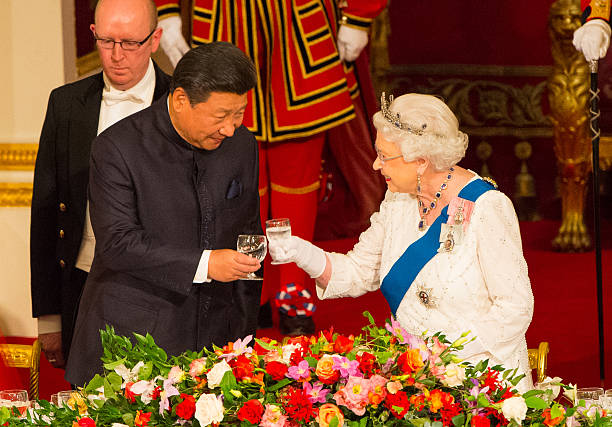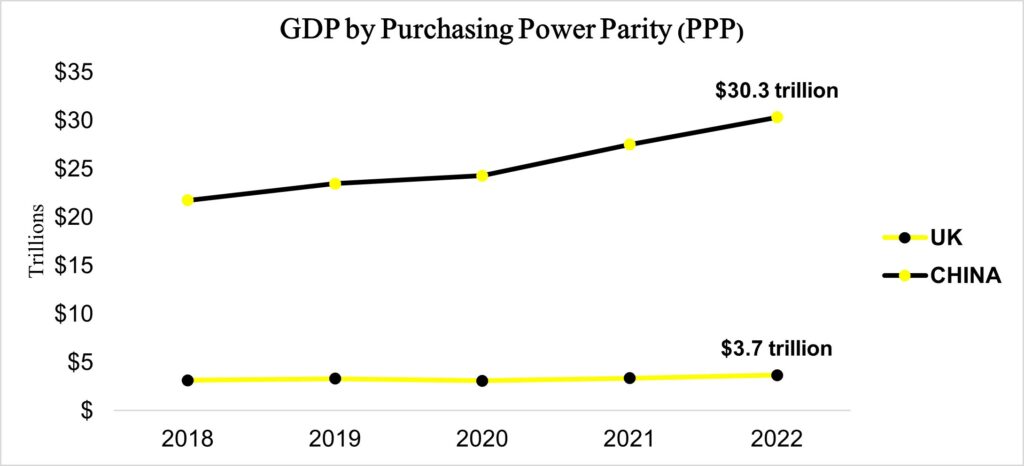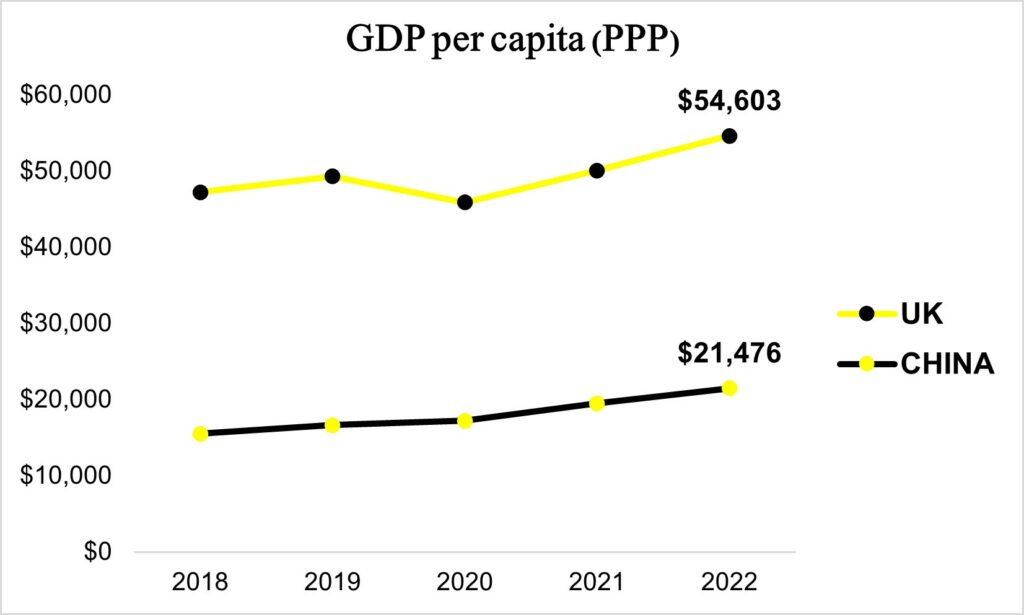“Britain is not a rival, it is not a competitor, it is not an enemy, it is not an adversary.” You would be forgiven for concluding from Chinese government spokesperson Vitor Gao’s remarks that China views the UK as irrelevant. But just how comparable are the two countries?
The Sino-UK relationship is currently under the media spotlight thanks to allegations of a Chinese government spy in UK parliament. This led political commentator Andrew Marr to invite Chinese government spokesperson Vitor Gao onto LBC to discuss the Chinese view of the Sino-UK relationship. When pressed on China’s opinion of the UK viewing it as a competitor, Gao’s response was a damning assessment of UK competition.
“What do China and Britain compete with? China is the largest manufacturer of automobiles, competing with Britain? No. China is the largest exporter of EV [electrical vehicle] cars…. Is Britain a competitor? No. China will be the biggest and most important producer and R&D in terms of semi-conductor in no time. Does that mean China competes with Britain? No. China will be the leading nation in AI revolution. Is Britain a competitor? No.”
Chinese media spokesperson, Vitor Gao speaks to LBC’s Andrew Marr, 2023

Gao concluded by suggesting the UK government avoid overestimating its global impact. Below, we will explore just how comparable the UK and China truly are, and whether Gao’s remarks downplayed the importance of a global Britain or were a reality check for a declining, once great power in the world.
The sheer scale of China dwarfs the UK
First, to get a sense of the vast difference in scale of China and the UK, let us take a look at the geography.
According to the latest ONS data, the UK population stands at just over 67 million people. When compared to China’s 1.4 billion population, the UK population is less than 5% that of China. China’s population alone accounts for 18% of the world’s population. The UK accounts for just 0.9%.
China is the fourth largest country in the world with a land mass of 9.6 million km². China’s smallest province, Hainan, is three times larger than the largest county in the UK, Yorkshire.
In terms of infrastructure, particularly poignant following the government’s latest update that its attempt at high-speed rail will no longer connect its second and third largest cities, China has built a complete high-speed rail network, longer than the rest of the world’s combined, from scratch, in just 20 years.
The absolute scale of China dwarfs a tiny island nation like the UK. This is important to keep in mind when considering economic comparisons.
The Chinese economy is exceedingly big compared to the UK economy, but the UK remains richer
China is the largest economy in the world. The UK is the eleventh largest economy in the world. The World Bank estimates UK GDP at purchasing power parity (PPP) hovers around $3 trillion. This figure is only a tenth that of China’s whopping $30 trillion GDP. This is unsurprising, given the vast differences in both population and size of the two countries outlined above.

Only when understood in terms of GDP per head of the population (per capita) can the two countries be compared. Using this figure, the UK’s GDP per capita (PPP) figure of $54,603 more than doubles that of China’s GDP per capita figure of $21,487. The UK is therefore richer than China on a person-to-person basis.

Having sought to understand the big picture of a UK-China comparison, let us now delve deeper into Gao’s comments about UK-China competition.
UK-China trade has little overlap
Gao was right to conclude the UK and China are not competitors when it comes to the technologies of tomorrow.

The two countries have little trade overlap thanks to differing economic specializations. The UK is the second largest exporter of services in the world whereas China is a manufacturing-driven economy.
UK service specialization means market leadership in sectors such as life sciences, education, finance, and insurance. China specializes more in electrical goods, textiles and machinery.
But what for the industries outlined by Gao in his critique of UK competition: electric vehicles (EV), semi-conductors, and artificial intelligence (AI)?
These industries represent the key technologies of the future. Which of the UK and China is innovating more in these industries? China.
China leads the UK in future technologies
To understand EV, we can look at EV sales as a proportion of total vehicle sales and the accompanying EV charging infrastructure which will enable the transition.
China’s EV sales penetration rate (the percentage of total vehicle sales) currently stands at 33% for the year 2022. Whereas the UK EV sales penetration rate hovers around 23%. Taken alone, these figures suggest the two countries aren’t too far apart on EV progress.
However, when understood together with EV infrastructure, the UK lags far behind China. The UK has an EV to charging point ratio of 17:1. That is 17 vehicles to every 1 charging point. That compares to China’s much lower rate of 2.5:1.
China powers the electronics of the modern world, the UK doesn’t
Now, let us look at semi-conductors. Semi-conductors come in many forms but at the most basic level are best understood as the devices that allow electrical currents to be manipulated and thereby power many of the electronic devices we use today.
You will have likely read the recent media storm surrounding Huawei’s new Mate 60 Pro. The reason for the intense media coverage is the device’s inclusion of advanced semi-conductors industry leaders thought China was not yet capable of developing.
The UK is not a competitor in this regard, with industry experts admitting the UK isn’t going to be developing ‘the chips powering the latest smartphones’ instead fulfilling less advanced, more specialized market demands.
AI leadership is a global endeavour
Finally, on AI, China’s recent draft AI regulations demonstrate its leadership in the sector and in future technologies more broadly.
Whilst the UK has its own upcoming global AI summit demonstrating some degree of regulatory leadership, China is invited. This suggests the government agrees China is not a competitor in AI but a vital partner. Indeed, a McKinsey report back in 2019 concluded that while the UK is an industry leader within Europe, it doesn’t come close to China.
The UK isn’t a competitor to China, nor is it a rival. The UK must rethink its approach to China going forward if it wishes to be taken seriously on the international stage. An active foreign policy focused on co-operation not conflict is key if the UK is to inject its stagnating economy with some much needed vitality.


